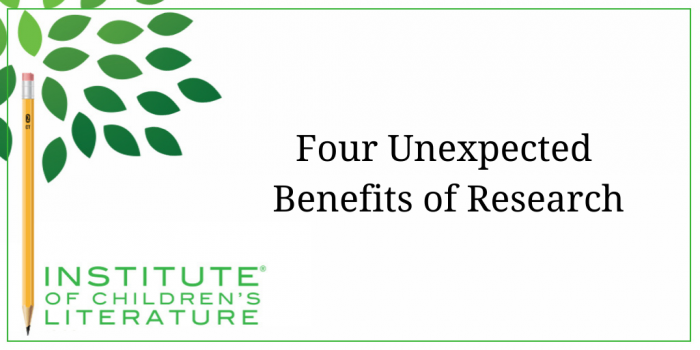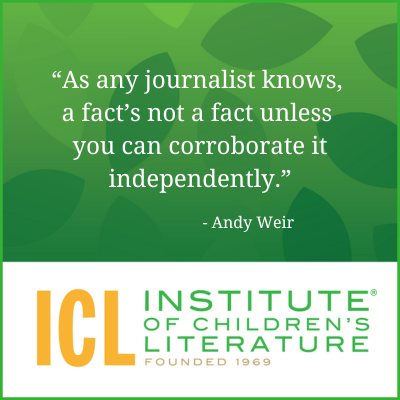1000 N. West Street #1200, Wilmington, DE 19801
© 2024 Direct Learning Systems, Inc. All rights reserved.

As a writer who regularly does extensive research, I’ve noticed some benefits to research as a lifestyle. Not only does quality research improve my writing, it often improves my life.
 1. Finding Answers Fast
1. Finding Answers FastMy daughter is in college and she’s doing well, but she hasn’t made research her life to the extent that I have. When she has a question, she tends to ask me. When I have a question, I turn immediately to research. So I can quickly find how to deal with certain stains or whether I’m experiencing side effects of a new medication (or just coming down with something). I can find out quickly how to fix things (or at least rig them to work temporarily). By making research a constant part of your writing life, you’ll soon find it bleeds over into all areas of your life. Because the more writing answers you’ve sought, the more places you’ve discovered that result in solid, trustworthy answers. And that’s a benefit that carries over everywhere.
As a person who loves to ask questions, I have sometimes crossed over into being a little nosy. But since I’m a writer, I am both fascinated by everything (whoa, shiny) and have a “get out of nosy free” card for question asking. I have peppered people with questions about their occupations and their hobbies, all prefaced with a remark about being a writer. People seem to love telling details and anecdotes to writers. And in the end, I not only get my curiosity sated, I also have tons of specific detail for when I eventually create a character with that job or hobby.
The world abounds in far too many writing scams. There are “publishers” who really mostly take money out of your pocket and deliver less than you could have if you’d invested the same money in actual self-publishing. There are “agents” who do much the same, coming up with all kinds of fees to take your money and give you nothing more than you could do on your own.

But it’s hard to scam a researcher because we ask questions. We look that gift horse right in the mouth and count his cavities. And if we don’t get answers that make sense (or we receive hostility in reply to our questions) we walk away, because we know that you can’t trust anyone who responds to questions with misdirection or anger. And good researchers, well, we ask our questions before we send out manuscripts.
We compile lists of good publishers and good agents by asking questions about names we find on the ‘net or that we find in market guides. And we ask a lot of questions if someone just pops into our inbox or messages us with “great deal.” We ask other writers. We track down details. We don’t jump just because someone dangled bait.
A true researcher doesn’t just collect facts to fill an article. A researcher sticks with a topic, digging until we understand. A friend of mine says we become “temporary experts,” because we dig and dig, question and question, until we reach a point of understanding. A researching writer won’t put vague sentences into an article to cover up a point they don’t really understand well.

In today’s world of instant information, the true researcher is incredibly valuable. A true researcher won’t confuse fact and opinion. A true researcher won’t take things on face value. A true researcher will question the agenda of the sources they find. A true researcher won’t ignore nuance, but will see it as a way to dig deeper into the subject. The truth is that a true researcher will spend time on research.
Time is a valuable commodity, but what that time reaps in terms of your writing and your life is well worth the investment. Be a good researcher and you’ll not only be sought after as a writer, but you’ll find more success in surprising areas of your life. I promise.
With over 100 books in publication, Jan Fields writes both chapter books for children and mystery novels for adults. She’s also known for a variety of experiences teaching writing, from one session SCBWI events to lengthier Highlights Foundation workshops to these blog posts for the Institute of Children’s Literature. As a former ICL instructor, Jan enjoys equipping writers for success in whatever way she can.
1000 N. West Street #1200, Wilmington, DE 19801
© 2024 Direct Learning Systems, Inc. All rights reserved.
1000 N. West Street #1200, Wilmington, DE 19801
© 2024 Direct Learning Systems, Inc. All rights reserved.
1000 N. West Street #1200, Wilmington, DE 19801
© 2024 Direct Learning Systems, Inc. All rights reserved.
1000 N. West Street #1200, Wilmington, DE 19801
© 2024 Direct Learning Systems, Inc. All rights reserved.

1000 N. West Street #1200, Wilmington, DE 19801
© 2025 Direct Learning Systems, Inc. All rights reserved.

1000 N. West Street #1200, Wilmington, DE 19801
©2025 Direct Learning Systems, Inc. All rights reserved. Privacy Policy.
4 Comments